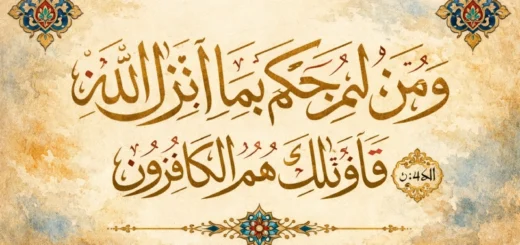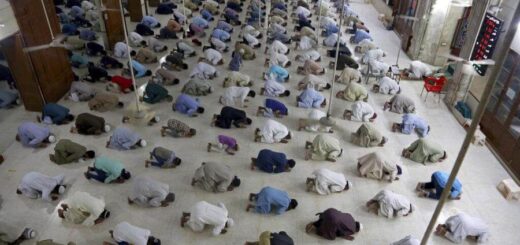A sickness, unto death

Getting your Trinity Audio player ready...
|
‘If you can keep your head, when all about you are losing theirs’
[dropcap]R[/dropcap]endered in the famous lines of ‘If’ by Rudyard Kipling (1865–1936), these seem apt words for the year 2020. Unlike previous years, the very notion of sickness or even death has resulted at times in quite hysterical responses amongst many. For those without a belief in the certitude of the afterlife, this on occasion can be understood, though not necessarily approved. Not so however for those who profess the testimonials of Islam yet would flee from the certitude of revelation to the irrationality of fear instilled by government. The startling change in attitude is not a positive turn.
In years gone by, reminders extracted from the texts of revelation would abound regarding the temporary fleeting nature of life, the inevitability of death, or the trials surrounding illness. While it may be quite easy to express utterance of these reminders, clinging firm to them as core principles can be more challenging. It is not merely the hollow words that ring on the tongue, but actions which follow from the deep conviction in the heart that the lord of all creation, Allah the exalted, has expressed these in the final revelation sent to mankind.
When faced with adversity or being put to trial, success in navigating a pathway is not to be found by fleeing from revelation into the arms of hysterical group think, or even worse, to embrace wholesale government propaganda. Rather, it is the opposite. The revelation in our possession establishes fundamental principles, firmer than steel, that provide each and every individual with a clear pathway, giving solace to the heart.
No matter how unpopular or against the grain it may seem, restating, reaffirming and expounding the core principles found in the texts of revelation must be done. The message must be reiterated far and wide, whether to young or old, to the healthy or the frail.
ولنبلونكم بشيء من الخوف والجوع ونقص من الأموال والأنفس والثمرات وبشر الصابرين
الذين إذا أصابتهم مصيبة قالوا إنا لله وإنا إليه راجعون
أولئك عليهم صلوات من ربهم ورحمة وأولئك هم المهتدون
And We will most certainly try you with somewhat of fear and hunger and loss of property and lives and fruits; and give good news to the patient
Who say, when afflicted with adversity: To Allah We belong, and to Him is our return
These will be given blessings and mercy from their Lord, and it is they who are rightly guided [2: 155/157]
Expressed with the highest eloquence, the aforementioned verses from the chapter of al-Baqara are a clear explicit reminder for all to read. Not only is there confirmation that being put to the test is inevitable, but there is also the succinct explanation of how to endure it, with the promise of mercy, blessings and right guidance. Evidently the verses do not proscribe a course of action born of hysteria nor indeed panic. Neither do they advocate the wholesale unquestioning obedience or acceptance of a devious government narrative.
[perfectpullquote align=”right” bordertop=”false” cite=”” link=”” color=”” class=”” size=””] ‘Perhaps your affliction has a good aftermath Perhaps bodies find health through maladies,’ Ibn Qayyim, Madarij al-Salikeen [/perfectpullquote]
From the Prophetic Sunnah we can also discern that there may well be blessings hidden within tests, particularly with regards to sickness. In the collection of Sunan by Abu Dāwud, he cites a tradition reported from the Prophet peace be upon him where he explained that illness acts as an expiation for sin:
حدثنا سهل بن بكار عن أبي عوانة عن عبد الملك بن عمير عن أم العلاء قالت عادني رسول الله صلى الله عليه وسلم وأنا مريضة فقال أبشري يا أم العلاء فإن مرض المسلم يذهب الله به خطاياه كما تذهب النار خبث الذهب والفضة
Sahl ibn Bakkār narrated to us from Abu ‘Awānah from Abdal-Malik ibn Umayr from Umm al-‘Alā, she said: The Messenger of Allah peace be upon him visited me while I was sick. He said:
Be glad, Umm al-Alā’ for Allah removes the sins of a Muslim for the illness, as fire removes the dross of gold and silver.
Similar is also confirmed in other Prophetic traditions, such as the narration reported from Ibn ‘Abbās appearing in Ṣaḥīḥ Bukhāri. While there is a substantial body of authentic traditions upon this theme, two in particular are worth pondering over – the first recorded in Ṣaḥīḥ Muslim, the second cited in Mu’jam al-Ṣaghir by al-Ṭabarāni:
حدثنا أبو بكر بن أبي شيبة وأبو كريب قالا حدثنا أبو أسامة عن الوليد بن كثير عن محمد بن عمرو بن عطاء عن عطاء بن يسار عن أبي سعيد وأبي هريرة أنهما سمعا رسول الله صلى الله عليه وسلم يقول ما يصيب المؤمن من وصب ولا نصب ولا سقم ولا حزن حتى الهم يهمه إلا كفر به من سيئاته
Abu Bakr ibn Abi Shayba and Abu Kareeb narrated to us they said Abu Usāma narrated to us from al-Waleed ibn Kathir from Muḥammad ibn ‘Amr ibn ‘Aṭā from ‘Aṭā ibn Yassār from Abu Sa’eed and Abu Hurayra that they both heard the Messenger of Allah peace be upon him saying:
Never a believer is stricken with discomfort, hardship or illness, grief or even with mental worry that his sins are not expiated for him.
حدثنا محمد بن يعقوب أبو صالح الوزان الأصبهاني حدثنا أحمد بن الفرات الرازي حدثنا محمد بن كثير حدثنا محمد بن فضيل عن الصلت بن بهرام عن أبي وائل عن البراء بن عازب قال قال رسول الله صلى الله عليه وآله وسلم ما اختلج عرق ولا عين إلا بذنب وما يدفع الله عنه أكثر
Muḥammad ibn Ya’qub Abu Ṣāliḥ al-Wazān al-Aṣbahāni narrated to us Aḥmad ibn al-Furāt al-Rāzi narrated to us Muḥammad ibn Kathir narrated to us Muḥammad ibn Fuḍeel narrated to us from al-Ṣalt ibn Bahrām from Abi Wa’il from al-Barā’ ibn ‘Aāzib he said the Messenger of Allah peace be upon him said:
The veins and eyes do not tremble with illness but due to sins, yet Allah repels even more.
‘And lose, and start again at your beginnings – and never breathe a word about your loss;’
The story of the Job (Ayub) peace be upon him also serves as an important Prophetic reminder of forbearance in the face of trial and illness. It is established with certitude that Job was from among the many Prophets sent by Allah and he indeed was from the righteous (Ṣāliḥeen), as mentioned in the verses [6: 84/85]. In his acclaimed work, Stories of the Prophets (Qiṣaṣ al-Anbiyā’) Ibn Kathir (1301-1373) recounts the story of Job peace be upon him, summarising as follows: ‘Job was repentant, remembering Allah with thankfulness, patience, and steadfastness. This was the cause of his rescue and the secret of Allah’s praising him.’ Several Qur’ānic verses provide the overview of Job’s story and the details provided should really be pondered over:
وأيوب إذ نادى ربه أني مسني الضر وأنت أرحم الراحمين
فاستجبنا له فكشفنا ما به من ضر وآتيناه أهله ومثلهم معهم رحمة من عندنا وذكرى للعابدين
Remember Job, when he cried to his Lord, ‘Suffering has truly afflicted me, but you are the Most Merciful of the merciful.’
We answered him, removed his suffering, and restored his family to him, along with more like them, as an act of grace from Us and a reminder for all who serve Us [21: 83/84]
واذكر عبدنا أيوب إذ نادى ربه أني مسني الشيطان بنصب وعذاب
اركض برجلك هذا مغتسل بارد وشراب
ووهبنا له أهله ومثلهم معهم رحمة منا وذكرى لأولي الألباب
وخذ بيدك ضغثا فاضرب به ولا تحنث إنا وجدناه صابرا نعم العبد إنه أواب
Bring to mind Our servant Job who cried to his Lord, ‘Satan has afflicted me with weariness and suffering.’ ‘Stamp your foot! Here is cool water for you to wash in and drink,’ and We restored his family to him, with many more like them: a sign of Our mercy and a lesson to all who understand. ‘Take a small bunch of grass in your hand, and strike with that so as not to break your oath.’ We found him patient in adversity; an excellent servant! He, too, always turned to Allah [38: 41/44]
‘If you can bear to hear the truth you’ve spoken – Twisted by knaves to make a trap for fools,’
Sickness may well lead to death, the ultimate leveller. Yet as a people who bear testimony to the truth of revelation, the Book of Allah expressly confirms that not only is life and death created to test who is the best in deed [67: 1/2], but that the time of one’s death is matter controlled by Allah. Whether it is disliked or even accepted, everyone faces this stark reality head on. And just as we bury our brethren and loved ones, so too will we be buried, passing from this plain of existence to another. The Qur’ānic verses are explicitly clear in this matter:
وما كان لنفس أن تموت إلا بإذن الله كتابا مؤجلا
No soul may die except with Allah’s permission at a determined time [3: 145]
كل نفس ذائقة الموت ونبلوكم بالشر والخير فتنة وإلينا ترجعون
Every soul is certain to taste death: We test you all through the bad and the good, and to Us you will all return [21: 35]
ولكل أمة أجل فإذا جاء أجلهم لا يستأخرون ساعة ولا يستقدمون
There is a time set for every people: they cannot hasten it, nor, when it comes, will they be able to delay it for a single moment [7:34]
These basic known tenets of Islam are not a matter subject to disputation. Has wahn – the love of this world and dislike of death – entered our hearts to the extent that it blinds us to the unequivocal realities of life? Do we fear illness and death because of the public narrative to the extent that we obviate or ignore the most basic principles established in Islam? Do the aforementioned Qur’ānic verses not resonate deeply within our souls to provide clarity to the nature of our present existence? Surely, these are matters to remind ourselves and others continually with.
Some say that the solution to the troubles engulfing the world is love. No doubt love is a powerful emotion, one that can be employed to help combat irrational fear. But the ultimate solution doesn’t reside with an abstraction, it is only to be found within the justice of Islam. If you agree, then stand forthright in campaigning for it, without shame, hesitancy or fearing the blame of the blamers. And together we may pray that Allah lightens the heavy burden we currently face.
يا أيها الذين آمنوا هل أدلكم على تجارة تنجيكم من عذاب أليم
تؤمنون بالله ورسوله وتجاهدون في سبيل الله بأموالكم وأنفسكم ذلكم خير لكم إن كنتم تعلمون
يغفر لكم ذنوبكم ويدخلكم جنات تجري من تحتها الأنهار ومساكن طيبة في جنات عدن ذلك الفوز العظيم
وأخرى تحبونها نصر من الله وفتح قريب وبشر المؤمنين
O you who believe, shall I show you a bargain that will save you from painful torment? Believe in Allah and His Messenger and struggle for His cause with your possessions and your persons – that is better for you, if only you knew. And He will forgive your sins, admit you into Gardens graced with flowing streams, into pleasant dwellings in the Gardens of Eternity. That is the supreme triumph.
And He will give you something else that will really please you – His help and a victory near at hand; and give good news to the believers [61: 10/13]



